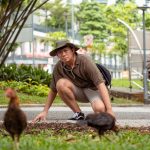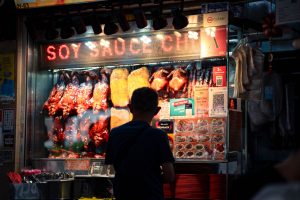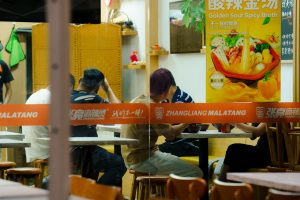Top Image: 27-year-old Peggy Goh working as a park ranger on her working holiday visa in Australia. Image courtesy of Peggy Goh.
The New Zealand sun has yet to rise. When it eventually does, the temperature will still be a cool 10°C at idyllic Havelock, a small town that’s a four-hour drive away from the city of Christchurch. The town is sound asleep, but Lim Hao is wide awake.
A nine-hour shift at a mussel factory awaits the 25-year-old Singaporean.
Inspecting mussels is a far cry from what he originally anticipated he would be doing with his degree: A Bachelor’s in Biomedical Engineering.
He needs none of the academic training from his time at the Singapore University of Technology and Design. Except perhaps, an eye for detail for his job: Inspecting wild-caught green-lipped mussels for quality in a factory in Havelock.
The same could be said about all the other work he finds around New Zealand, where he has been since May.
He was a server, clearing dinner plates and wine glasses at a convention centre in Christchurch. He washed dishes at a cafe at Christchurch’s Botanic Gardens. He even found himself doing odd jobs around a stranger’s house near Christchurch in exchange for food and accommodation.
“I did some gardening and miscellaneous chores around my host’s house. I got a room and three meals a day. I wanted to experience local life in a more connected way instead of being some tourist.”
He moved on to be a mussel inspector at a factory, where he currently works.
“But it was fun working those odd jobs. I made a lot of friends. I’ve learnt to enjoy myself and adapt to whatever environment,” he says.
“Working here is so different because you experience a country differently. You form much more connections with different people.”
He never stays in one place for too long, partly because his working holiday visa doesn’t allow it—and partly because he wants to experience as much as possible. Lim Hao is essentially fulfilling a dream of going on a sustainable forever holiday: Odd jobs fund his expenses, and his off days are spent sightseeing.
The only problem is that working holiday visas don’t last for long; Lim Hao plans to return to Singapore this December. Tentatively, he adds.
Why a Working Holiday Visa?
Working holiday visas allow young Singaporeans aged between 18 and 30 to go on extended holidays while working in the country they’re visiting to fund their stay. Singaporeans can freely go on a working holiday only in two countries: Australia and New Zealand.
Currently, Lim Hao works for minimum wage: NZ$22.70 (S$18.44) per hour. The money he saves needs to be split between living expenses and future tours around New Zealand. New Zealand’s minimum wage ensures that Lim Hao has enough money for basic expenses and to save for his vacationing.
“There’s a Malaysian couple that currently works in the same factory as I do. They’ve been here for 15 years because the pay is so much better for them.”
Inspecting mussels garners a respectable NZ$3,600 a month. It’s a salary that might not be as high if Lim Hao inspected the same green lipped mussels in Singapore, if there were any mussels to inspect that is.
He has a few thousand dollars saved for a rainy day, but he avoids dipping into that stash. Working holiday visas require applicants to have a minimum amount of money before entering the country.
A working holiday visa in Australia requires applicants to have a minimum of AU$5,000 (S$4,370.33) to prove one has enough money to fund a stay in the country. Also, applicants must prove they have enough money to buy a ticket to leave the country at the end of their stay.
Across the Tasman Sea, the minimum wage in Australia is AU$23.23. That’s about AU$800 a week. The minimum wage also keeps pace with inflation, so workers in blue-collar jobs feel a sense of security provided by a safety net.
Peggy explains that the wage floor motivates her to work harder. It helps you save and fund your next steps on your working holiday visa.
With a degree in engineering, Lim Hao’s next step (as forecasted by the lifepaths of Singaporeans before him) is to get a job and build a stable career in the industry. He chose otherwise.
“I wanted to experience life before I have to think of jobs, responsibilities, and bills. It might just be that I’m procrastinating about finding a job in Singapore. Probably not.”
Lim Hao’s past four months in New Zealand have not been completely free of, as he puts it, “jobs, responsibilities, and bills.” He keeps track of expenses and savings, thinks of accommodation, and looks out for job vacancies in places he’s headed to.
Lim Hao only has himself to rely on if he makes a misstep in his planning. He cannot fall back on his family home in Singapore, call close friends for help, or find comfort in the chicken rice at Katong Shopping Centre. The stakes are slightly higher for a working tourist in New Zealand.
Yet, he admits he’s happier.
“Things are really chill here. Most of the time, people are either just chilling or relaxing. They’re really big on welfare here, so they make sure that people get taken care of. There’s a deeper level of connection between the people here.”
Perhaps what Lim Hao—like so many other Singaporeans on working holiday visas—wants to escape from is the predictability of Singaporean life.
In Singapore, 8,525 kilometres away from New Zealand, Lim Hao was privileged enough to have life go according to a typical Singaporean’s plan: Graduate with a degree or diploma, find a stable job, and apply for a BTO. He wanted to break out of the predictability of Singaporean life.
A Leap of Faith
31-year-old Peggy Goh, who was on a working holiday in Australia (and is currently on her second one in New Zealand), alludes to the unpredictability of working overseas. It attracted her to apply for working holiday visas, allowing her to write her own adventures.
“I did this because it was something I wanted to do before I turned 30. My purpose is to do jobs I cannot do in Singapore—working at a ski resort, working in nature or the outdoors. Non-office kind of jobs.”
Peggy worked at a production house in Singapore before she left for Australia in 2018. In Australia, she worked at a farm; she worked as a park ranger at Great Ocean Road; she handled guest services and reservations at a ski resort.
“My best experience was picking cherries at a cherry farm. It was so fun. You talk to people from all walks of life. I was just having a good time. Working holidays allow you to discover a life you didn’t know you could have. Every weekend, you can go hiking, camping, kayaking, and so on.”
“I really wouldn’t trade anything for any of my experiences.”
Working abroad while still holidaying seems exciting. But the decision to up yourself and leave the comforts of home behind affects everyone all the same.
“There’s a lot of self-doubt when moving overseas alone,” Peggy explains. “My parents are quite conventional, but I’m thankful they supported me. I’m an only child, so I’m quite close to them. It seems like a selfish decision, but sometimes you have to pursue the selfish decision to live the life you want.”
Family members of other Singaporeans on working holiday visas might not be as supportive as Peggy’s, however. Leaving Singapore, even temporarily, is time spent away from loved ones—a concern Zachariah Buy contended with.
The 28-year-old held a job in events management for Little Creatures Microbrewery in Singapore. Near the end of 2019, he decided to leave a working holiday for New Zealand with his partner.
“It took a few years for me and my partner’s family to understand why we left. Maybe it’s because working holidays are new, so it takes some time to get it.”
The first step towards a working holiday is hard, and the journey after doesn’t get any easier. Conveniences in Singapore, which we feel entitled to here, are often not promised in New Zealand or Australia.
“The one thing I miss about Singapore is the accessibility. You can get food at any time of the day. We don’t have that here,” Zachariah explains.
Life skills that we take for granted in Singapore become necessary—setting up furniture, cooking, and navigating your way through a foreign place on your own.
Building Something Different or Losing Out?
But, according to the people RICE spoke to, the most valuable experience was learning about yourself.
“My car broke down on my first day of work on a cherry farm,” Peggy recounts. “I stayed in a very rural area at the time. It was a 10-minute drive but about a one-and-a-half hour’s walk. A car passed by, stopped, did a three-point turn, and asked whether I needed a lift.”
“It was an Australian lady. I realised that people genuinely wanted to help you on your journey.”
Through her encounters with people of different backgrounds and cultures, Peggy explains that forming these connections is one of the most fruitful parts of the journey because you learn so much from people outside the conventional classroom when you’re travelling.
“Travelling solo might sound scary, but it turned out to be one of the best experiences ever. When you’re travelling solo, locals invite you to local events and you get to experience really awesome stuff.”
This ‘Eat, Pray, Love’ journey comes at a cost, at least when viewed through a local lens. A year away in Australia or New Zealand is a year which could have been spent building a career. The gap widens between you and your peers back home.
“I think I am really privileged to be able to do this. I respect all my peers in Singapore who are hustling. Sometimes, I see my friends in senior roles, making good money. But I really wouldn’t trade anything for my experiences,” Peggy remarks. “Plus, some employers value global experiences.”
It has to be said that not everyone can drop their stable careers to do odd jobs overseas. There are differences in the levels of privilege. Some can holiday without worrying about funds at all. These Singaporeans on working holiday visas are privileged in a different way—they work to sustain their travels.
Zachariah, who is now working towards earning permanent residency in New Zealand, agrees.
“I don’t see it as losing out. I see it as building something different for myself. That’s all. It’s really the independence you get to experience living on your own.”
Whichever way you look at it, these Singaporeans see working holiday visas simply as something different. It’s not better or worse than any other path.
The Allure of a Working Holiday Visa
When Lim Hao returns to Singapore this December, he will finally return to the path he strayed from only seven months ago.
“Maybe I’ll be pulled in a different direction. Or something different entirely. It’s never too late to start on an entirely new path, is what I think.”
Singaporeans like Lim Hao, Peggy, and Zachariah, challenge our ingrained expectations of finding a job and sticking with it immediately after graduation. They’re part of a growing number of Singaporeans who are more open to finding new ways of living out our days outside the constant hustle we’re used to.
While not everybody in Singapore has the luxury to afford working holiday visas, perhaps, at the very least, it gives us permission to slow down whenever possible.
But the thought of Singapore is a few months too far in the future for Lim Hao. He sets his sights on what he will do next in New Zealand. “The real adventure begins when I save enough money and I get to travel around to different places. There’s a lot more things I want to do.”
He will have to begin his planning again after he finds his next job—the expenses, the accommodation, the savings, and the new job.
For now, he will have to prepare for his shift tomorrow morning, which begins at 6 AM and ends at 3:30 PM. Those green-lipped mussels aren’t going to inspect themselves.
He can take comfort in the fact, however, that he’s one day closer to the weekend. Perhaps off to another adventure, one of many he’s had since his working holiday visa.







